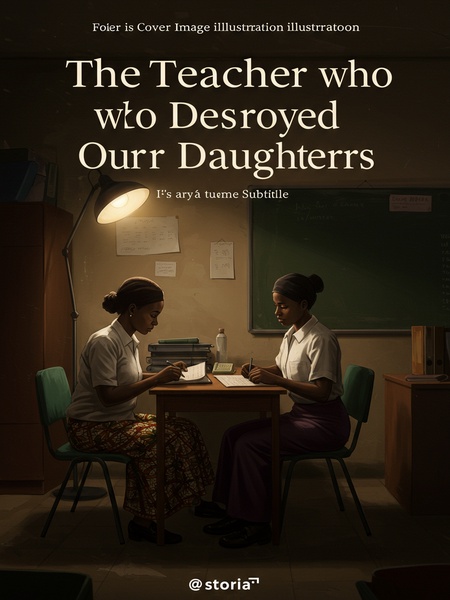Chapter 2: Papa Chukwudi’s Grief
The girl's name was Ifunanya. Both her parents had died, so she had always stayed with her grandfather, Papa Chukwudi, who was a farmer in the village.
Papa Chukwudi was one of those men who wore the same faded Ankara wrappers day in, day out, with dust always clinging to his sandals. Some would call him stubborn, others just old-fashioned, but nobody doubted he loved his granddaughter—the only family he had left.
After the incident, we found the heartbroken Papa Chukwudi to question him, and that was when we learnt the details.
He welcomed us into his compound, voice shaking. His hands trembled as he spoke, eyes red from crying. His wrapper was stained with dust, one slipper missing. Neighbours kept peeking over the low fence, whispering.
As Ifunanya’s only guardian, he actually had no idea the child was pregnant.
He explained, head bowed, that the world was moving too fast for him. “My eye don weak, I just dey happy say the girl dey chop well. Who go think say belle dey hide there?” He swore on the family’s ofo staff that he had no clue.
During those eight or nine months, Ifunanya’s belly did get bigger, but Papa Chukwudi just thought she was growing and adding weight.
He said, “Sometimes, I go talk say, ‘Ife, this your stomach dey rise o!’ She go laugh, say na beans. I no suspect anything. Children dey grow anyhow these days.” He even remembered how his late wife had once joked that girls in these times grew faster than before.
So, when Ifunanya complained of stomach pain that day, he just assumed it was ordinary stomachache.
He remembered giving her palm oil to lick—old remedy for stomach trouble. “Rest small, my daughter,” he had said, “you go dey alright.”
He told her to rest at home and drink more water, nothing serious.
He had gone out to the farm after, thinking nothing was wrong. “Na just small wahala,” he repeated to us, his voice weak.
He never imagined Ifunanya was about to give birth.
He looked up at us, pain in his eyes. “How I for know, my people? Even for dream, I no fit imagine say my pikin dey carry belle.”
So, as usual, he worked till evening before coming home.
It was just another day—he had spent hours tilling the yam ridges. “If person no farm, hunger go kill am,” he said, rubbing his callused palms together.
When he got back, he immediately noticed something was off.
The house was too quiet, as if the air itself was holding its breath. The goats were restless outside, and nobody called out, “Papa, welcome.”
Ifunanya was lying still on the bed. Her lower body, plus the bedsheet and wrapper, were soaked in blood.
He had shouted, “Ife! Ife!” but she didn’t answer. The sight of so much blood made his legs weak—he almost fell, clutching the doorframe. He started praying, voice cracking, calling on God and his ancestors.
She must have been in terrible pain, suffering for a long time.
Later, the nurse told us it must have taken hours. Papa Chukwudi wept, saying he wished he’d never left the house that morning.
This sad death, though eventually called an accident, had a very bad effect on the community. Our criminal investigation team was sent down, with me and my colleague Tunde Bello leading the matter.
People started locking their doors earlier. Whispers ran through the market—“This one no be ordinary death o.” Even the church prayed for deliverance. Tunde and I arrived in our battered patrol van, feeling the weight of all those watchful eyes.
Because she was just 12, according to the law, whether she agreed or not, anybody who slept with her was suspected of rape.
There was no room for argument. In this country, a child is a child. Even the local pastor quoted scripture about protecting the innocent.
We asked Papa Chukwudi if he knew if Ifunanya was close to any man, but he said he didn’t know anything.
He shook his head again and again. “She no dey waka anyhow. Na only school and church.”
Even though we didn’t ask him directly, we couldn’t help but suspect him a bit.
I caught Tunde’s eye; both of us were thinking the same thing, though it felt wrong. You can never be too careful—even family can hide wickedness. In our line of work, suspicion is like a second skin.
After all, Papa Chukwudi was just 52 at the time. In the village, it’s not strange for people to become grandparents in their early forties, since people marry and give birth early.
He still looked strong, too. The old men in the palm wine joint joked about how these days, men became grandfathers before their beards even went fully grey.
If it was really him, that one na real wickedness.
The thought made my stomach turn. “God forbid,” I muttered under my breath, but we had to check.
With no sign of many suspects, our only hope was DNA testing. Whoever fathered the child was the criminal.
We sent samples straight to the state lab, praying for a quick answer. The villagers gathered in small groups, guessing aloud who the culprit could be.
Luckily, the test showed that Papa Chukwudi was not the father of Ifunanya’s baby.
When the results came, I felt both relief and shame at having doubted the old man. He broke down again, thanking God and hugging us, but the pain didn’t leave his eyes.
So, who was the father?
That question seemed to hang in the hot, dusty air, as if the answer itself didn’t want to come out.
Continue the story in our mobile app.
Seamless progress sync · Free reading · Offline chapters